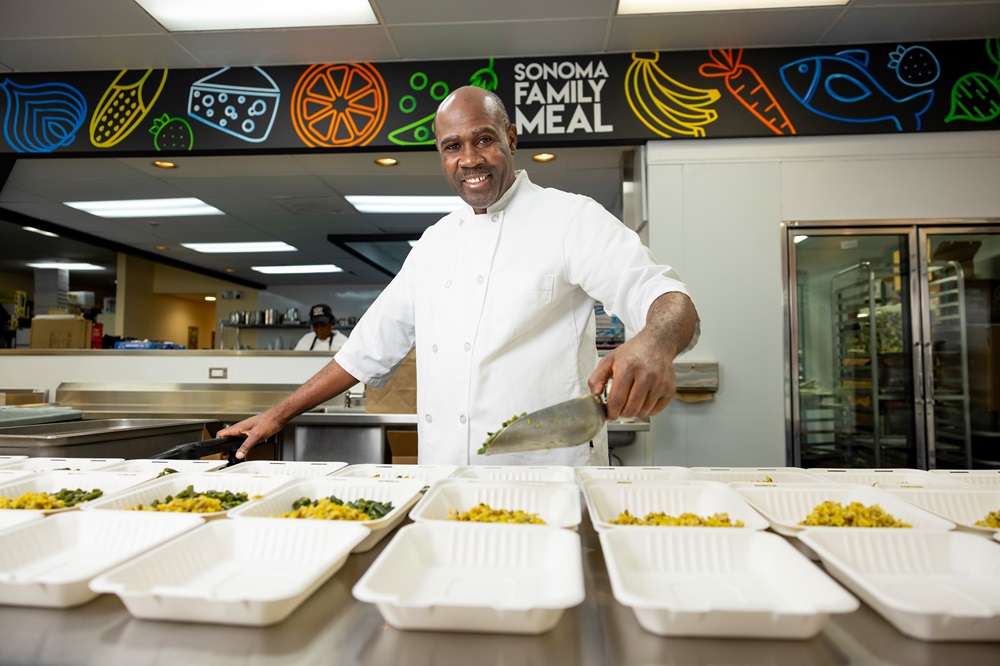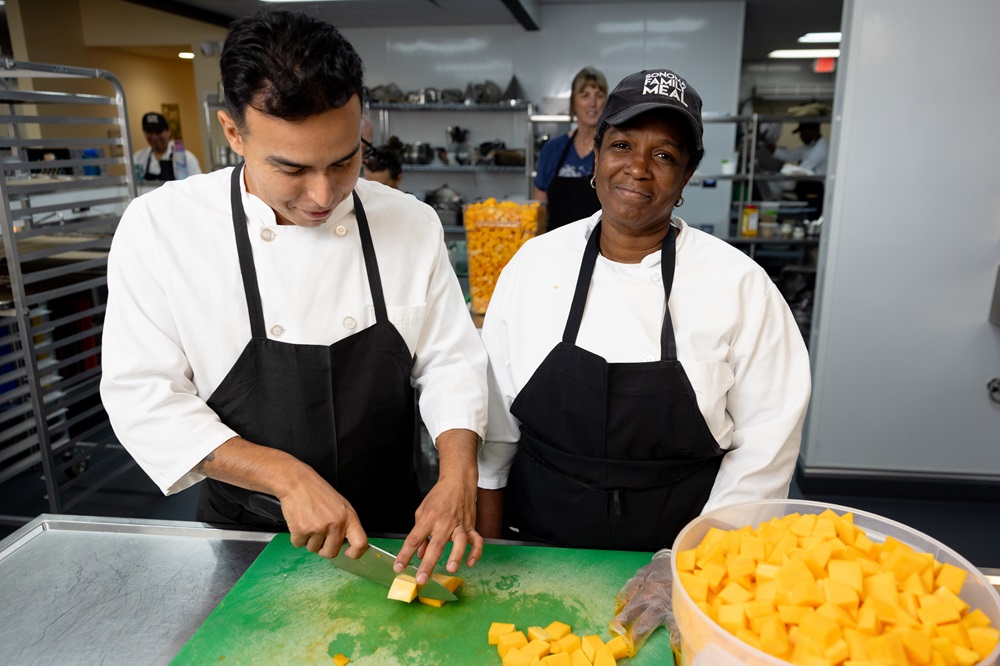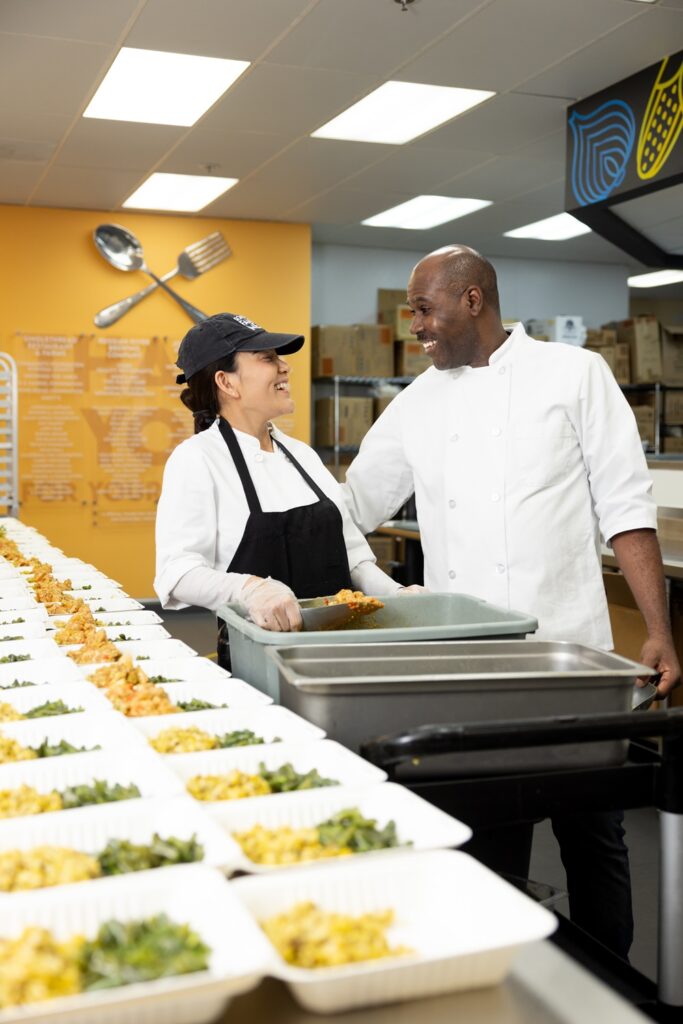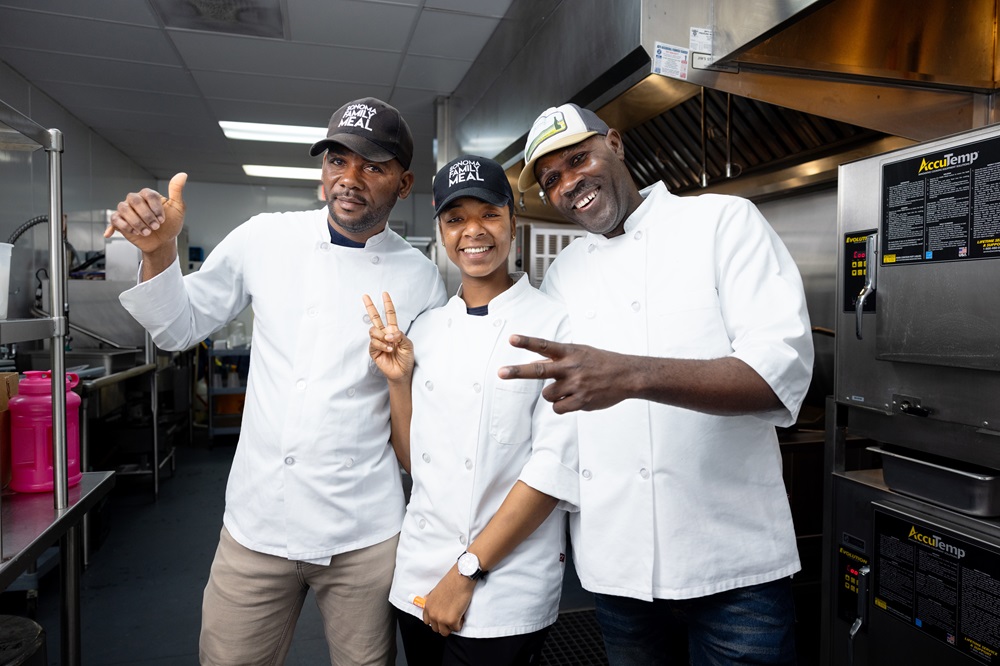A Global Table at Sonoma Family Meal
PHOTOS BY PAIGE GREEN
“I come from a country where hunger dominated our population,” explains Jules Sinai, who arrived in Sonoma County last year from Haiti, “so, I know the importance of feeding people and am passionate about food and the happiness it can make in people’s lives.”
Despite recent false claims from fear-mongering politicians, Haitian immigrants are arriving to the United States with a rich and delicious culinary heritage—one that Sinai is proud to share with his new American neighbors. This includes his favorite, jouwoumou, a Haitian squash soup, as well as dishes like twice-fried plantains, pork griot slow-cooked with citrus and served with pickled vegetables, and pen patat, a sweet potato pudding with coconut milk, cinnamon, and a touch of rum.
These mouth-watering delicacies were just a few of the international offerings at a recent pop-up hosted by Sonoma Family Meal, a Petaluma-based nonprofit organization. Alongside dishes from Sinai’s home country, customers could also order Afghan ginger chicken, Oaxacan tamales, Jordanian baklava, and Fijian cassava cake, to name just a few. The chefs behind this eclectic array are all participants in Sonoma Family Meal’s culinary program that offers no-cost, bilingual culinary job training for low-income individuals facing barriers to employment.
Like Sinai, most of the trainees arrived in America escaping turmoil back home—be it war, violence, or natural disaster—and have since found not only employment but solace through food as well. Which is fitting, seeing as the organization shaping the course of this program was also born from disaster.
In the fall of 2017, as the Tubbs Fire roared down from the hills, jumped highways, and incinerated entire neighborhoods along the way, tens of thousands fled their homes, abandoning everything that wouldn’t fit in hastily packed cars. Among the things they left behind, of course, were kitchens, refrigerators, and cabinets full of food. Waiting it out in evacuation shelters, on friends’ couches or, in some cases, camped out alongside the road, many were left wondering about their next meal.
That’s when Heather Irwin, a food writer for The Press Democrat—who had herself just evacuated—started making calls to her many food industry connections. Within days, as the fires still raged and the sun turned red, they’d assembled an impromptu kitchen where countless volunteers began pouring in to help chop, wash, stir, bake, and assemble meals for those in need. Local farmers arrived in trucks with donations of produce, and community organizations collaborated to help distribute meals around the county.
When the smoke cleared, that ragtag kitchen of volunteers had managed to serve a whopping 20,000 meals in just three weeks! As Sonoma County assessed the damage—36,810 acres burned, 5,643 structures destroyed, and 22 people killed—at first, it appeared as if the wildfire hadn’t discriminated, scorching mansions and trailer parks alike. But as time went on, it became clear: the fire had exacerbated food insecurity among those already struggling, disrupted their lives and fragile livelihoods, and laid bare long-standing inequities.
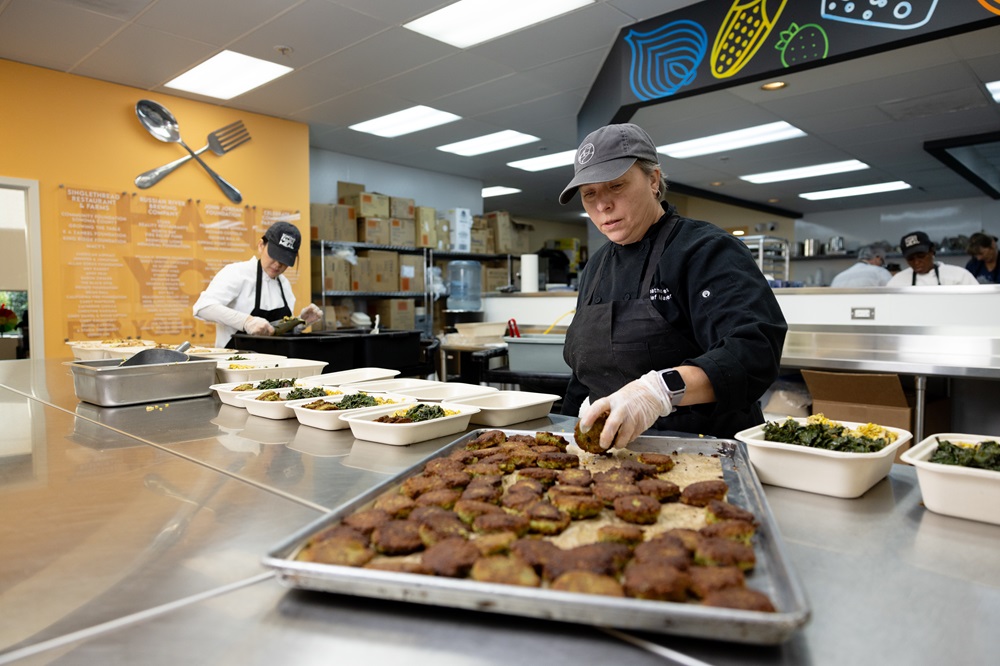
Seeing the unique challenges faced by vulnerable and lower-income residents during the long recovery, Irwin and those behind the kitchen efforts realized that the need for their services didn’t end with the fire but could be put to use year-round, and so was born Sonoma Family Meal.
During the next few years, this nascent organization operated out of seven borrowed kitchens, relying on volunteers and just a single paid employee, offering healthy meals to those who needed it most. When the pandemic arrived in 2020, the need for their services once again surged. But this time, some of the greatest need was among food industry professionals as a multitude of restaurants shuttered and thousands found themselves out of work. As the line between those receiving food and those who were cooking it blurred, it suddenly became clear: Sonoma Family Meal could make just as much difference in their own kitchen as it did on the dining room tables of those they’d been serving.
The following year, Whitney Reuling was hired as executive director, and by 2023, with the help of 10 new staff members, she helped launch the first cohort of a new culinary training program. Participants, primarily Sonoma County-based immigrants and refugees, not only receive an education in the kitchen but food assistance for themselves, a stipend, and job-placement support.
While the trainees might be new to this country and don’t arrive with much, Reuling emphasizes that they’re not entirely starting from scratch. “We’re teaching new professional skills,” she explains, “using the expertise and culture they already have.” And this rich culture was on full display during their last lunch pop-up where participants proudly designed a menu featuring dishes from seven different countries around the world. For Sinai, it meant so much more than just kitchen techniques—it also gave him a sense of of confidence and belonging.
“Now,” he says, “I know about food safety, knife skills, and baking. With the skills that I learn from this program, I can make a positive impact in any kitchen.” Sonoma Family Meal helps connect graduates with local employers, and so far, they boast an 80% placement rate. This includes Sinai who today works full time as a prep cook at Kendall Jackson, where he continues to learn and grow. “I receive a lot of support from the team and the chefs,” he says, “and I enjoy every opportunity and moment of it.”
But despite enjoying his new gig here in Sonoma County, Sinai hasn’t forgotten about his homeland or those he left behind. “Haiti is a beautiful country with a lot of potential,” he explains. “Our natural rivers and creeks, our music and culture, our food and beaches make us unique in the Caribbean. But politics and politicians make it the worst place at this moment.” Arriving in the United States, Sinai assumed he’d escaped the worst of “politics and politicians,” which is why he was surprised to suddenly find himself the target of malicious lies and dangerously xenophobic rhetoric, not just from average people but from those vying for power in the White House. “Please hear that we, Haitian people, don’t eat people’s pets,” he implores. “We are not thugs. We are hard workers who come here for a better life. We pay taxes as everyone and invest in this country’s economy.”
For Reuling, the culinary training program at Sonoma Family Meal is about more than just helping those in need. She believes that a more equitable and diverse culinary industry is good for everyone: employers, workers, customers, and even the economy at large. Despite political propaganda claiming otherwise, immigrants not only fill important jobs that many native-born Americans don’t want, they also start one in five new businesses in America and have an entrepreneurial spirit well above average, one that’s proven to carry on in their children. And rather than take jobs, per capita, their businesses employ more people than those started by nonimmigrants.1. 2.
The value of immigrants in the food industry, explains Reuling, extends beyond just economics. Their cultural contributions to the American palate enhance our experience and our diets. But there’s still much work to be done towards that goal here in Sonoma County. “There’s a real reckoning in the industry right now,” she explains. “People are beginning to ask whose food is represented in the culinary world and why.” Graduates from her program, she believes, could soon make their mark.
While Reuling is careful about not growing the organization too fast, she does have big dreams. She wants to expand the trainings, add specialized tracks such as baking, and incorporate internships with local businesses. She’s even playing with the idea of a satellite kitchen in north Sonoma County. For now, Sonoma Family Meal is still busy serving up 800 meals every week. And, never losing sight of their roots, they are still collaborating with emergency planners, making sure their kitchen is ready to jump back into action if and when catastrophe strikes again.
There’s an irony to the idea that refugees like Sinai fled disaster back home only to arrive in the United States to prepare for disaster here. But when a community is rooted in love and unity rather than division and fear, there’s one thing that food and disaster have in common: they both bring people together.
Sonoma Family Meal
sonomafamilymeal.org | 707-978-2340

